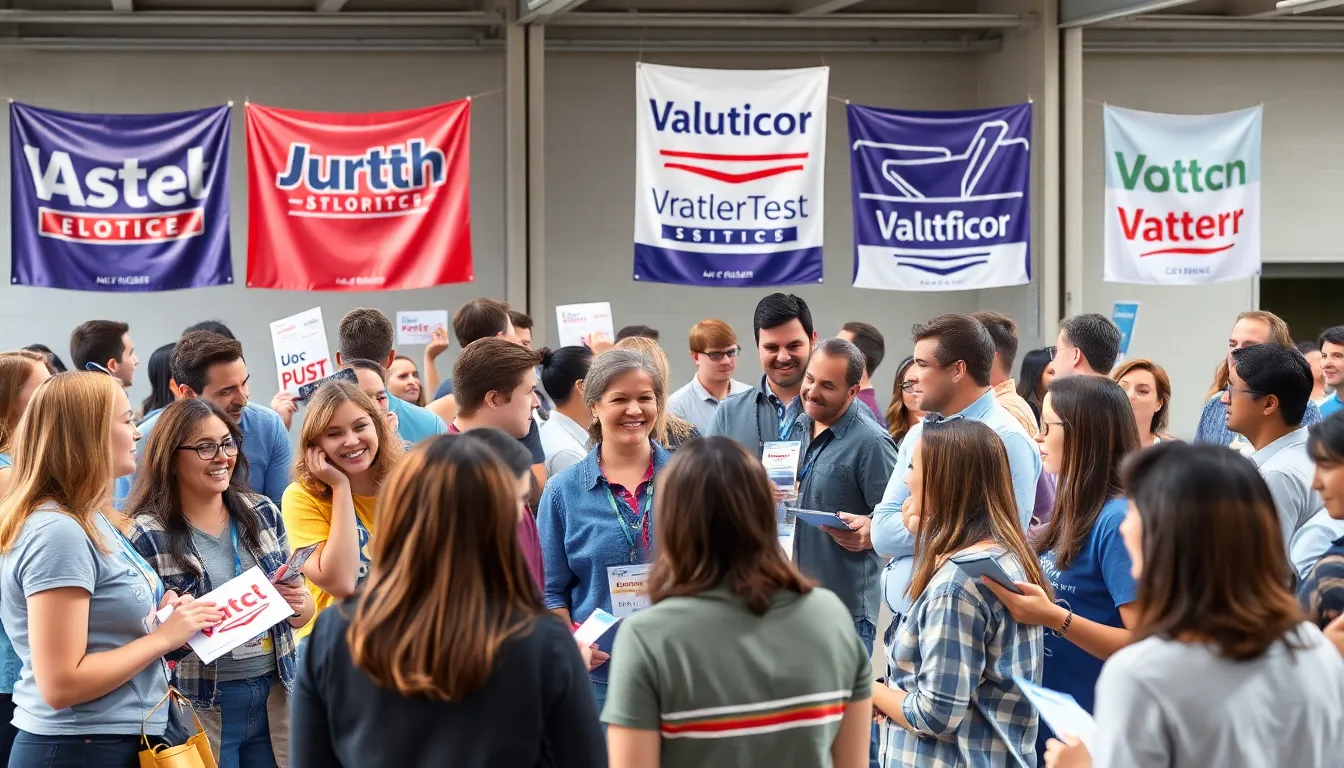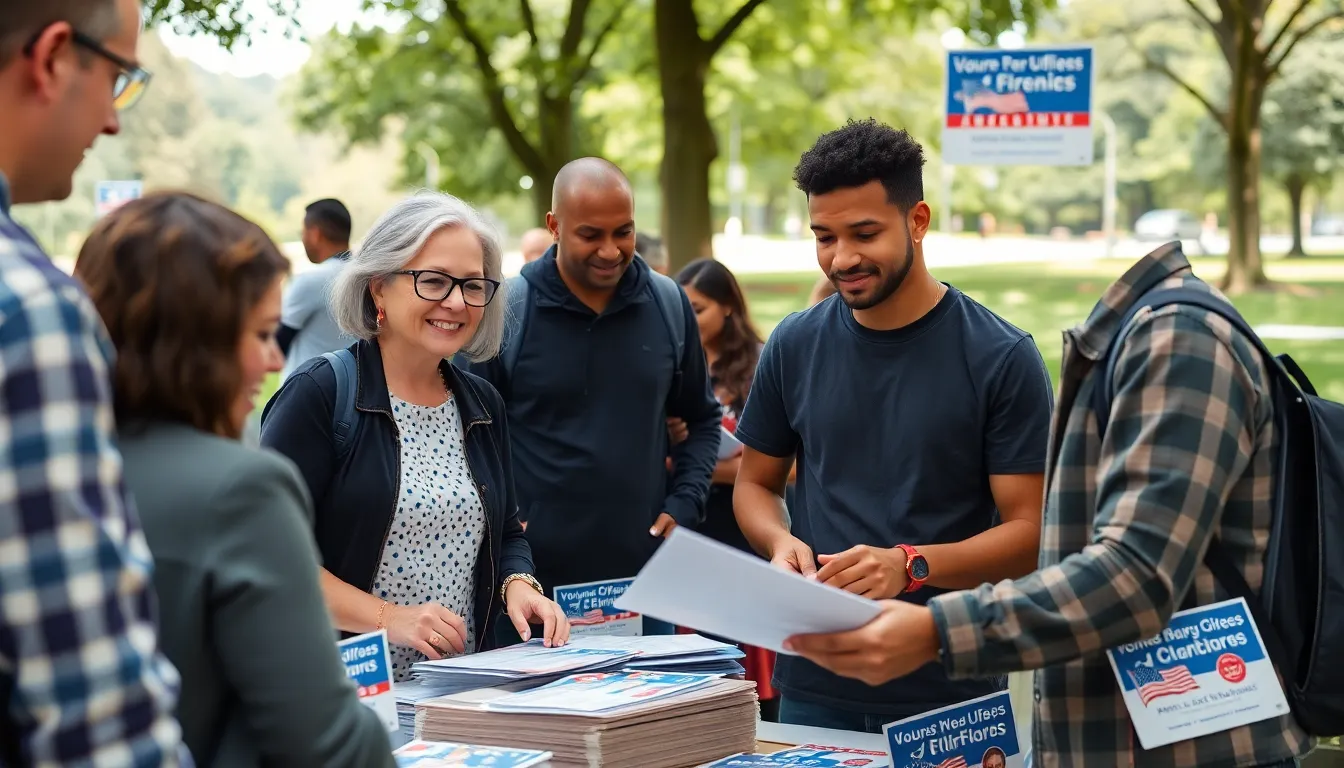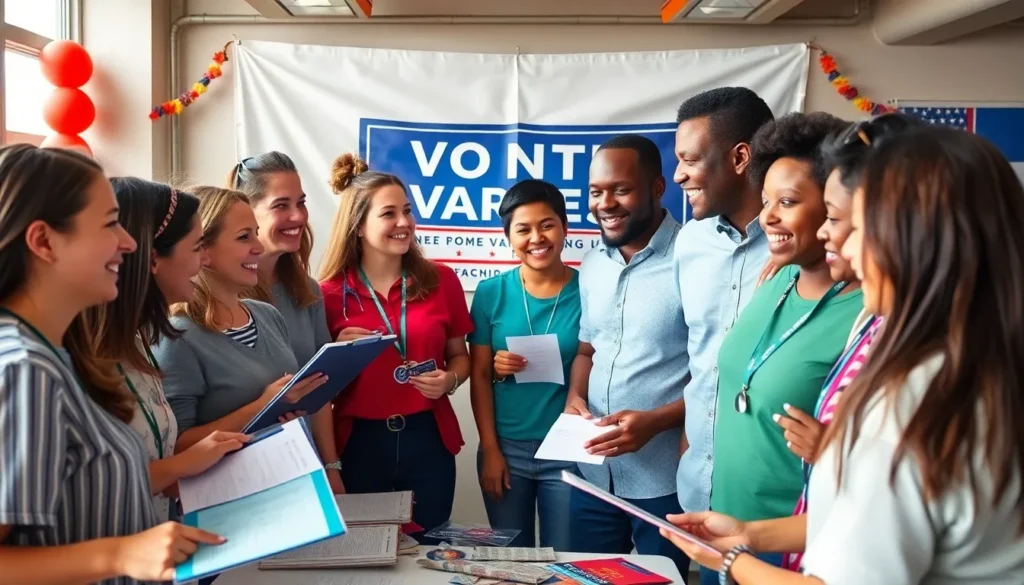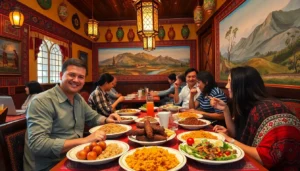In a world where political debates can feel more like reality TV than serious discourse, getting involved in a campaign can be your chance to make a difference—and maybe snag a few free snacks along the way. Volunteering for a political campaign isn’t just about handing out flyers; it’s about joining a passionate team that’s ready to change the world, one door knock at a time.
Understanding Political Campaigns
Political campaigns play a crucial role in shaping government and community policies. Volunteers contribute significantly to the success of these efforts.
Importance of Volunteering
Volunteering for a political campaign creates a platform for individuals to make an impact. Engaging with like-minded peers fosters a sense of community and shared purpose. Campaign volunteers often gain valuable skills, such as communication and organization. Experience gained can enhance resumes and open doors for future opportunities. A commitment to volunteering may lead to lasting connections within the political arena. Supporting a candidate can amplify voices that align with personal values.
Types of Campaigns
Campaigns generally fall into three main categories: local, state, and federal. Local campaigns focus on community issues, emphasizing city council or school board elections. State campaigns tackle broader concerns, like legislative seats or governor races. Federal campaigns engage in national elections, targeting the presidency and congressional positions. Each campaign type offers unique volunteer opportunities tailored to specific needs. Volunteers may choose the campaign type aligning with their interests and availability. Understanding these distinctions helps volunteers identify the path that best fits their goals.
Finding Opportunities


Volunteering for a political campaign involves exploring various avenues to find the right fit. Many options exist, ranging from local initiatives to national movements.
Researching Local Campaigns
Researching local campaigns offers insight into specific needs within the community. Start by checking the websites of local candidates or political parties, as they often list volunteer opportunities. Attend town hall meetings and community events to connect with candidates and campaign teams directly. Conversations with like-minded individuals can reveal additional volunteering prospects and create networking opportunities. Keeping an eye on local news can also help identify emerging campaigns in need of support. Engaging with these local efforts provides a unique chance to influence change where it matters most.
Online Platforms for Volunteer Opportunities
Online platforms present a convenient way to discover volunteer opportunities for political campaigns. Websites like VolunteerMatch and Idealist specialize in connecting volunteers with organizations. Social media channels also play a vital role; following candidates or relevant political organizations can uncover new opportunities. Moreover, dedicated campaign websites frequently feature sign-up forms for volunteers. Utilizing political action committees provides access to a wider range of campaigns seeking assistance. Each of these platforms offers a simple method for individuals to get involved and find a campaign that resonates with their values and interests.
Preparing to Volunteer
Preparing to volunteer for a political campaign requires understanding specific skills and time commitments. Individuals benefit from knowing what to expect in these areas.
Skills and Qualifications
Effective communication remains essential for volunteer roles, whether it involves canvassing or phone banking. Organizational skills play a crucial part in assisting campaign events and managing resources. Familiarity with social media platforms helps promote the campaign and engage supporters. Many campaigns seek enthusiastic individuals with a strong interest in politics, as passion often fuels motivation. Some positions may require prior experience, while others simply call for a willingness to learn. Overall, diverse skills enhance teamwork and contribute to campaign success.
Time Commitment
Volunteering demands flexibility in time commitment, varying based on campaign needs. Some campaigns require hours during weekdays, while others lean toward weekends. Short-term projects, like events, may need a few hours of concentrated effort. Longer-term commitments often encompass regular shifts that build over several months. Understanding personal availability allows hopeful volunteers to align their schedules with campaign activities. Balancing these commitments with existing responsibilities remains vital to ensuring a productive volunteer experience. Prioritizing time effectively enhances engagement and builds stronger connections within the campaign.
Getting Involved
Volunteering for a political campaign involves several clear steps. Engaging in this process ensures a rewarding experience and impactful participation.
Application Process
Starting the application process is straightforward. Candidates typically find online forms on campaign websites. Filling out these forms usually requires basic personal information and areas of interest. Some campaigns may request a brief statement about motivations for volunteering. After submitting the application, expect confirmation emails with further instructions. Reviewing the timeline of the campaign helps understand when to anticipate contact regarding next steps. Many applicants appreciate that some campaigns allow for multiple roles, ranging from event planning to phone banking.
Training Sessions
Training sessions play a vital role in preparing volunteers. Campaigns often schedule these meetings shortly after welcoming new recruits. Participants gain essential insights into campaign goals, messaging, and constituency engagement. Trainers frequently cover best practices in communication and outreach strategies during these sessions. Some organizations even provide supplemental materials, like handbooks or online resources, to reinforce learning. Attending these sessions helps ensure volunteers feel confident in their roles, enhancing overall campaign effectiveness. Active participation also fosters a sense of community among volunteers, strengthening connections within the campaign.
Making an Impact
Volunteering for a political campaign provides unique opportunities to contribute to significant change. Engaging in various roles not only impacts the campaign but also enriches the community.
Effective Volunteer Roles
Different volunteer roles exist within political campaigns, each tailored to specific needs. Campaign organizers coordinate events and manage logistics to ensure everything runs smoothly. Phone bankers reach out to voters, sharing information about candidates and initiatives. Canvassers go door-to-door, engaging with the community directly to garner support. Social media coordinators craft posts that highlight campaign messages, reaching a broader audience. Many campaigns also seek data entry volunteers to maintain accurate records. Each role plays a critical part in driving the campaign’s success.
Engaging with the Community
Connecting with the community is vital for political campaigns. Personal interactions through events and meet-and-greets foster relationships between candidates and voters. Engagement broadens when volunteers participate in community service, demonstrating commitment to local issues. Attending town hall meetings allows volunteers to gather insights directly from constituents. Listening to community concerns helps shape campaign strategies that resonate. Utilizing social media encourages discussions, enabling volunteers to amplify campaign messages. Building strong community ties enhances voter trust and mobilizes support for candidates.





